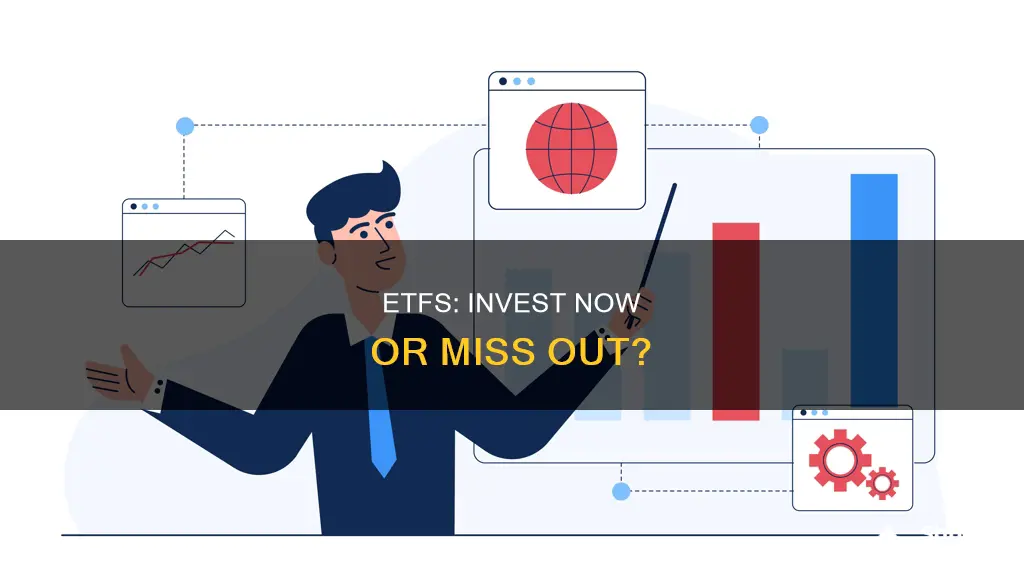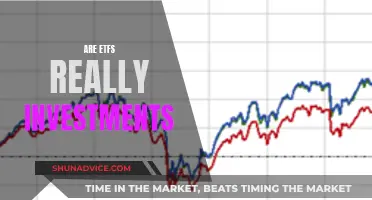
Exchange-traded funds (ETFs) are a popular investment vehicle that offers investors a range of benefits, including diversification, low costs, and ease of trading. They are ideal for beginners and long-term investors as they provide a simple and relatively safe way to enter the stock market.
ETFs have been around since 1993 and have exploded in popularity due to their cost savings and diversification benefits. They are similar to mutual funds but trade like stocks, allowing investors to buy and sell them on an exchange throughout the trading day.
ETFs can contain a variety of assets, including stocks, bonds, commodities, and currencies, and they can be used to gain exposure to specific sectors, industries, or asset classes. They are also highly transparent, making it easy for investors to know what they are invested in.
However, ETFs do have some disadvantages, such as potential liquidity issues and the risk of the fund closing. Additionally, ETFs may not be as focused on a specific sector or industry as their names suggest, and they may have higher costs compared to investing in individual stocks.
Despite these drawbacks, ETFs remain a popular choice for investors due to their accessibility, diversification, and low costs. They are a good option for those looking to invest in a variety of assets without having to conduct extensive research or purchase individual stocks.
What You'll Learn

ETFs: Pros and Cons
Pros:
- ETFs are a low-cost way of investing in a diversified portfolio of stocks, bonds, and commodities.
- They are traded on exchanges throughout the day, giving investors more control over their investments.
- ETFs are considered low-risk investments.
- They are tax-efficient compared to mutual funds.
- They are ideal for long-term investors and beginners.
- They are more liquid than mutual funds.
- They can be used to gain exposure to specific sectors or asset classes.
Cons:
- ETFs may have limited diversification, especially in certain sectors or foreign stocks.
- Intraday pricing may induce unnecessary trading.
- Costs may be higher when compared to investing in specific stocks.
- Dividend yields may be lower than with individual stocks.
- Leveraged ETFs can amplify losses.
- There is a risk that an ETF will close, forcing investors to sell and reinvest.
Investing in Bharat 22 ETF: Is It Worth It?
You may want to see also

How to Invest in ETFs
Exchange-traded funds (ETFs) are a type of security that pools multiple securities into a fund that can be traded like an individual stock on an exchange. ETFs can be structured to track anything from the price of a commodity to a large and diverse collection of securities.
ETFs are a good investment because of the benefits they deliver to investors. They provide the ability to buy multiple assets in one fund, the risk-reducing benefits of diversification, and generally low costs to manage the fund.
- Open a brokerage account: You need a brokerage account to buy and sell securities like ETFs. You can open an account online with a traditional broker or a robo-advisor, which builds and manages an investment portfolio for you, often using ETFs.
- Find and compare ETFs: There are thousands of ETFs to choose from, so use screening tools to narrow down your options based on criteria such as asset type, geography, industry, trading performance, fund provider, expense ratios, trading volume, holdings, and performance history.
- Place your order: Navigate to the trading section of your brokerage's website and buy the ETF using its ticker symbol. Specify the number of shares you wish to buy and choose from different order types, such as market order, limit order, stop order, or stop-limit order.
- Sit back and relax: Congratulations, you've made your first ETF investment! These funds can form the basis of a well-diversified portfolio. You don't need to constantly check their performance, but you can access that information through your brokerage's website or by searching the ticker symbol online.
ETFs: A Smart Investment Strategy for Your Money?
You may want to see also

ETFs vs. Stocks
Exchange-traded funds (ETFs) and stocks are similar in some ways, as ETFs often contain many stocks. However, they are fundamentally different and present various upsides and risks.
A stock represents fractional ownership in a business and typically trades on an exchange. When you own a stock, you're investing in the success of that company and that company only. In the short term, stocks may fluctuate massively for many reasons, and market sentiment often determines how a stock performs day to day. In the long term, a stock's performance more closely follows the company's growth.
ETFs, on the other hand, are collections of assets, often stocks, bonds, or a mix of the two. A single ETF might own dozens, sometimes hundreds, of stocks. So, by owning a single share of an ETF, investors can own an indirect stake in all the stocks (or other assets) held by the fund.
ETFs often invest in stocks that have a specific focus area, for example, large companies, value-priced stocks, dividend-paying companies, or those operating in a specific industry. Some specialized ETFs allow you to potentially earn higher returns. Most ETFs are passively managed, meaning that they replicate a specific index of assets.
Because of their wide array of holdings, ETFs provide the benefits of diversification, including lower risk and less volatility, which often makes a fund safer to own than an individual stock. An ETF's return is the weighted average of all its holdings. So, if it owns many strong stocks, the ETF will rise. If it owns many poorly performing stocks, the ETF will decline.
| ETFs | Stocks |
|---|---|
| Low-high, depending on the investment | Low-high, depending on the investment |
| Potentially infinite | Potentially infinite |
| No commission at major online brokers | No commission at major online brokers |
| Any time the market is open | Any time the market is open |
| Can be taxed at short-term or long-term capital gains rates, depending on the holding period | Can be taxed at short-term or long-term capital gains rates, depending on the holding period |
Advantages of investing in stocks:
- Investing in an individual stock can deliver very high returns.
- You won't be taxed on any capital gains until you sell, in a taxable account.
- Stocks can pay dividends, and these dividends can rise over time as top companies increase their payouts.
- Commissions on stock trading have been slashed to zero at major online brokers.
- Investors who hold a stock for more than a year may enjoy lower capital gains tax rates.
Disadvantages of investing in stocks:
- Stocks can fluctuate a lot from day to day and month to month, and you may need to sell at a loss.
- Volatility can be dangerous for investors who have all their wealth tied up in just one or a few stocks.
- Stocks aren't an investment guaranteed by the government, so you may lose all your money.
- Because an individual stock tracks the performance of the company over time, you have to own a winning company to make money.
- Much effort is required to analyze and value individual stocks.
Advantages of investing in ETFs:
- ETFs allow you to buy one fund and have a stake in dozens or even thousands of companies.
- ETFs offer the power of diversification, reducing your risk and increasing your returns.
- A well-diversified ETF, such as one based on the S&P 500, can beat most investors over time.
- ETFs tend to be less volatile than individual stocks.
- The best ETFs have low expense ratios.
- ETFs can be bought and sold any time the market is open, giving you a highly liquid asset.
- ETFs can be traded at no cost at most major online brokers.
- It takes little investing expertise to invest in ETFs and earn high returns.
- You won't be taxed on any capital gains until you sell the ETF in a taxable account.
- Like stocks, ETFs can pay dividends.
Disadvantages of investing in ETFs:
- ETFs, even in a good year, will underperform the best stocks in the fund.
- ETFs do charge an incremental cost, the expense ratio, for owning the fund.
- Not all ETFs are the same, so investors have to understand what they own and what it could return.
- The investment performance of ETFs isn't guaranteed by the government, and you could lose money on the investment.
- You can't control what's invested in any single fund.
When to choose stocks over ETFs:
- You enjoy analyzing and following individual companies.
- You want to find outperformers.
- You're an advanced investor with time to devote to investing.
When ETFs are the better choice:
- You don't want to spend much time investing.
- You want to beat most investors, even the pros, with little effort.
- You don't want to analyze individual companies.
- You're a new or intermediate investor.
- You want to invest in a specific trend without picking winners.
Of course, it's possible for investors to do both. For example, you could have 90% of your portfolio in ETFs and the remainder in a few stocks that you enjoy following.
Natural Gas ETF: A Guide to Investing Wisely
You may want to see also

ETFs vs. Mutual Funds
Exchange-traded funds (ETFs) and mutual funds are popular investment vehicles that offer diversification and professional management. However, they differ in several key ways, including:
Trading and Pricing
ETFs trade like stocks on an exchange and can be bought and sold throughout the trading day, providing intraday liquidity. The price of an ETF is market-based and updated continuously throughout the day. On the other hand, mutual funds can only be bought and sold at the end of the trading day, and their price, known as the net asset value (NAV), is calculated after the market closes.
Minimum Investment
ETFs typically have a lower minimum investment requirement, often as little as the cost of a single share. In contrast, mutual funds usually have higher minimum investments, ranging from a few hundred to a few thousand dollars.
Management Style
Most ETFs are passively managed, meaning they track a market index or sector index. Mutual funds, on the other hand, are usually actively managed by fund managers who aim to beat the market. Actively managed funds tend to have higher fees and expense ratios due to higher operating costs.
Tax Efficiency
ETFs are generally considered more tax-efficient than mutual funds. As passively managed portfolios, ETFs tend to realise fewer capital gains, resulting in lower tax liabilities for investors. Mutual funds, especially actively managed ones, may trigger capital gains taxes for shareholders when the fund manager sells securities for a profit.
Suitability
ETFs are often favoured by investors seeking lower investment minimums, more control over trade prices, and the ability to trade during the day. Mutual funds may be preferred by those who want to set up automatic investments or withdrawals and those seeking a fund that could potentially outperform the market.
Investopedia's Guide to ETF Investing: Getting Started
You may want to see also

Should I Invest in ETFs Now?
Exchange-traded funds (ETFs) are a good investment because of the benefits they deliver to investors. They can generate significant returns if the right funds are selected.
ETFs are considered low-risk investments because they are low-cost and hold a basket of stocks or other securities, increasing diversification. They also tend to have much lower expense ratios compared to actively managed funds, can be more tax-efficient, and offer the option to immediately reinvest dividends.
However, ETFs do have some disadvantages. They may have less diversification than investing in individual stocks, and intraday pricing might cause unwise trading. Costs could also be higher when compared to investing in a specific stock, and lower dividend yields may be a factor for some investors.
When deciding whether to invest in ETFs, it is important to evaluate your financial goals and risk tolerance. ETFs can be a great option for long-term investors and those with shorter-term horizons, as well as beginners who may not have a lot of experience in the markets.
- It is relatively easy to invest in ETFs, and you can buy and sell them on an exchange like a regular stock.
- ETFs have two major tax advantages over mutual funds: lower capital gains taxes and the ability to avoid higher short-term capital gains tax rates.
- Some ETFs may have potential liquidity issues and there is a risk that the ETF will close if it doesn't bring in enough assets to cover administrative costs.
- When investing in ETFs, it is important to remember that the performance of the ETF depends on the weighted average performance of its underlying holdings.
In summary, ETFs can be a good investment option for those looking to diversify their portfolio and reduce risk. They are particularly suitable for long-term investors and beginners. However, it is important to consider the disadvantages and evaluate if ETFs align with your financial goals and risk tolerance.
ETFs: A Smart Investment Strategy for Your Money?
You may want to see also
Frequently asked questions
ETFs are a good kind of investment because they offer benefits such as the ability to buy multiple assets in one fund, diversification, and low costs. ETFs can generate significant returns for investors if they select the right funds.
ETFs hold stakes in various assets, including stocks and bonds, whereas a stock is an ownership interest in a specific company. ETFs are more diversified, and by buying a stock ETF, you reduce your risk by putting your eggs in many baskets rather than just one or a few individual stocks.
ETFs can be a good choice for beginners as they are relatively inexpensive and tend to be less risky than investing in individual stocks. However, if the ETF is investing in market-based assets, it can still lose money as these investments are not insured against loss by the government.







